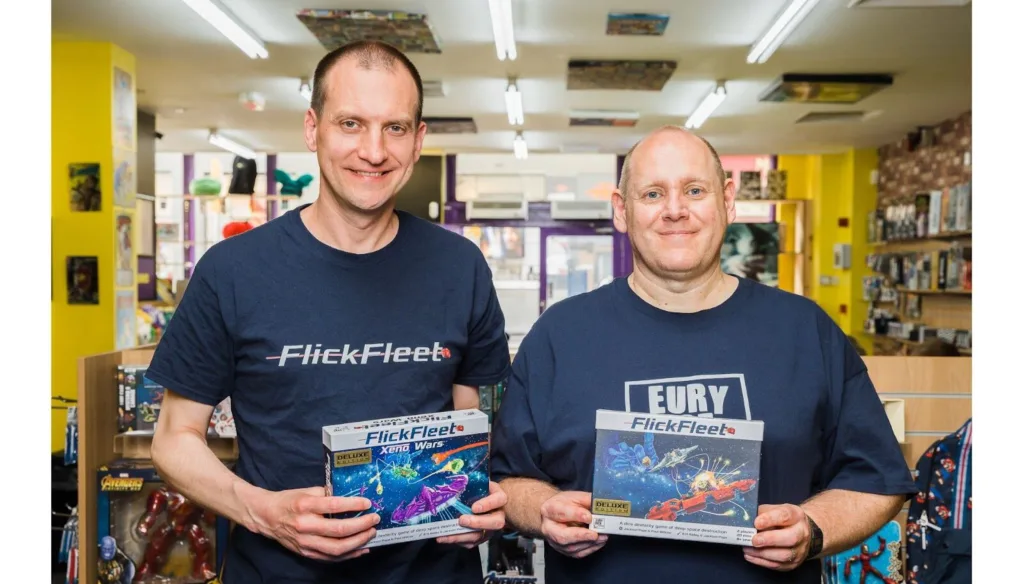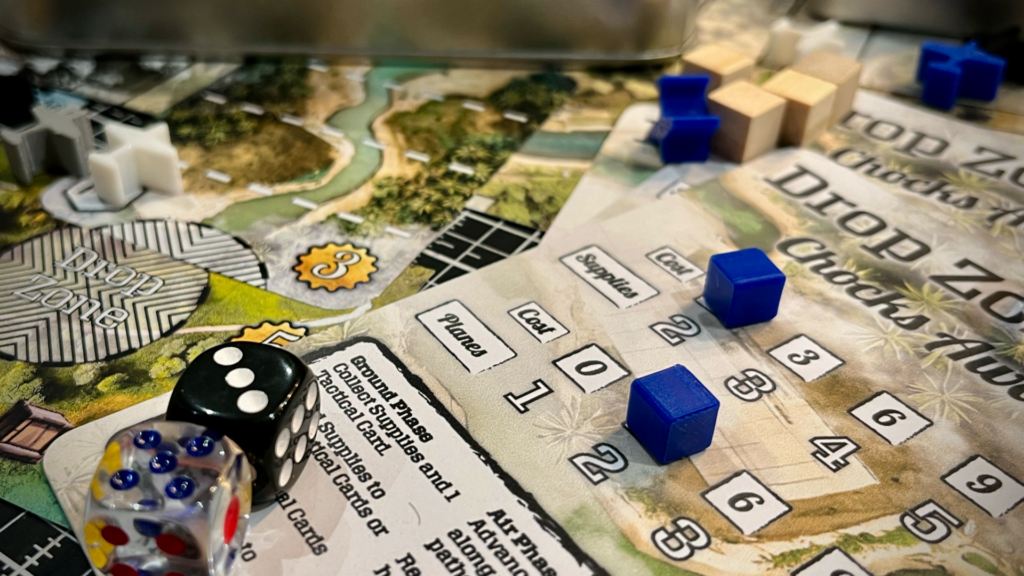Welcome back to the What If? Blog! This time I’m chatting with Jackson Pope, half of the team behind Eurydice Games. Jackson’s been designing and self publishing games for nearly 25 years, creating everything from the critically acclaimed FlickFleet to myriad of print and play games. What makes Jackson particularly interesting is his thoughtful, principled approach to design.
We dive into his design philosophy document, explore how concrete principles can guide creative decisions, and discuss the changes he’s witnessed in board gaming over two decades. From the democratisation of publishing through crowdfunding to the challenges of Brexit and tariffs, Jackson offers a perspective you can only get from someone who’s been in the game (great joke Joe) for the long haul. It’s a conversation about craft, persistence, and what it really means to have a design philosophy.
Enjoy.
Joe: Heya Jackson. Welcome to the blog. Can you let us know what brings you to the world of games design?
Jackson: I’ve been interested in gaming since I was a kid, both tabletop and video games. During my teens and early twenties I spent a lot of my time designing bits of computer games, but it was difficult to make a full game in my spare time. After a bad experience playing Mighty Empires, I figured I could design something similar and so my first game, Border Reivers was born. After moving to York I decided to try making a small hand-made print run of Border Reivers and so I started my first board games publishing company. And so began my nearly 25 year love affair with designing and self-publishing small print runs of hand-made games.

Joe: I like that you took something you didn’t like, thought “I can do better” and then made your first game. Looking back at that experience and your first game, what do you think you learned from it? Tell us a bit about it.
Jackson: We played Mighty Empires for 36 hours over one weekend. At the 2/3rds mark, a random event (something to do with dragons from memory), took the guy who was winning through good play and decisions into last place, where he remained until we had to give up and go home. I thought two things straight away, one: who’s got time to play a >36 hour game (and this was before I had kids!) and two: random events are fine, but they shouldn’t have that much of an effect on the game. Border Reivers was my attempt at a similar style of game and played in 20-90 minutes, depending on player count. While it still had dice to resolve combat, I aimed to make it more under player control so the randomness wouldn’t have such a large effect.
Joe: Hate something, change something, make something better is one of my favourite phrases and it looks like what happened with Border Reivers!
So you and I are part of the same playtest UK group, up in Newcastle upon Tyne. And we were testing something a couple of weeks ago and you showed me your design principles. Before we get into the weeds, can you tell me where that idea of noting your own principles came from?
Jackson: It was something Nick Bentley, formerly of Underdog Games recommended on Bluesky. You can read the post here.

Joe: Great. We can take a look. How are you using it and how is it helping you?
Jackson: I found writing it in the first place was a great way to explore what’s important to me in a game, and my designs. And periodically checking and either refreshing it or tweaking things helps too. Being able to use it as a yardstick for a design is great too. For example, a game I’m working on all works nicely, but the final event lacks player choices. One of the tenets in my Design Process Document is that ‘games should reach a thrilling crescendo, not whimper out’, so I know this one still needs work.
Games should reach a thrilling crescendo, not whimper out.
Joe: Let’s dive into a couple of your principles. Can you share two that you think are important, and unpick them a bit – why have they made it into the little black book (as it were)?
Jackson: Here’s a couple of favourites:
- Choices, Choices Games are a series of interesting and important choices. Each choice should be meaningful with pros and cons associated with each option (even if the con is just opportunity cost).
- Once more with feeling Games should have a ‘feel’ – the emotions they elicit in the players.
Joe: A few weeks back at the NE Expo we tested one of your games, I don’t recall the name. I wonder if you could describe how your design principles are specifically supporting the development of that game?
Jackson: We played Coalescence, a dexterity game about crafting a solar system. Concrete examples of the two principles above: in the game you flick a disc into rocks trying to create planets. Sometimes you end up in a bad place though, and there’s no easy flicks to perform. To give you an interesting choice every turn, I enabled players to move their disc to a more advantageous position at the start of any turn. But it costs a point to do so! And for the feel, I was trying to echo the highs and lows of FlickFleet, our other dexterity game, where the random interactions of a dexterity game often have unintended (positive or negative!) outcomes.

Joe: You mentioned Nick Bentley’s influence on documenting design principles – have any of your principles evolved or changed significantly since you first wrote them down? What triggered those changes?
Jackson: Not hugely, I’ve tweaked the wording of them a bit, but in essence they are the same. To be fair, I only started maybe four months ago, so they haven’t had long!
Joe: That’s interesting that they haven’t changed much in four months, it suggests you had a pretty clear sense of your design philosophy already. I’m curious about the practical side of this. When you’re actually sitting down to work on a game, do you literally pull out this document and check against it, or has it become more internalised? And have you ever had a moment where a principle forced you to scrap or significantly rework something you were otherwise happy with?
Jackson: I’ve been designing games since 2002! I found thinking about them and writing them down really useful, but it was largely stuff I’d internalised over the last 23 years. I’ve not yet come across a case where I’ve had to remove something I liked because it clashed with the principles, but it’s been useful to look at a game that’s not quite there and compare it to the principles as a yardstick. For example, I’ve a game about Vikings hunting trolls. I’ve been working on it for a few years now and it’s close, but not quite there. Comparing it to the principles clearly shows that the ending is anti-climactic, and there aren’t enough choices for the player during the end game. So it focuses my attention on which bits need work and what are the issues that need fixing.
Joe: These principles are such a useful tool.
I’m wondering if I might explore something slightly different to round out the blog. You’ve been designing games for over 2 decades, that’s impressive! I wonder if you can describe some of the big changes you’ve seen in board games design over that time?
Jackson: By far the biggest one is crowdfunding. Back when I started, if you wanted to publish games you had basically three options: do it on a very small scale, largely by hand (like I did); invest a huge amount of your own money in starting a publishing company; or pitching to an established publisher. With the advent of Kickstarter and then the rest of the crowdfunding ecosystem you had a fourth option which really democratised games design – if you could pitch your game effectively (an ability to market things well hugely helps here!) direct to gamers, then you could get it made. It’s been both a boon and a curse though I think. Obviously as a designer it lets you get your baby made and into the hands of gamers, which is great. But it’s also hugely increased the number of games that are published, so there’s much more competition, and the lifespan of a game has decreased significantly as it’s easy to get distracted by the constant stream of shiny new games.

We’re really lucky that FlickFleet has managed to last, it was released initially in 2018, but we’ve been releasing a new expansion for it every year since (kind of falling into the shiny new trap ourselves!). It’s still selling really well seven years later, which is not true of a lot of games, including our roll and writes unfortunately.
The other big change is macroeconomic. Brexit has made attending shows such as Spiel in Essen, Germany a much harder proposition, and now Trump’s tariffs have made selling to the US a much more difficult prospect, which is unfortunate for us as over 50% of our sales have historically been to the US. We’ll need to adapt to that as we have to Brexit, which keeps us on our toes!
What strikes me most about Jackson’s approach is how deliberate everything is. After 25 years in the game, he’s not just designing by instinct, he’s actively codifying what works and why. The design principles document isn’t just a nice idea, it’s a working tool that helps him diagnose problems and focus his efforts. When he says the Viking game needs work on choices and crescendo, he’s not guessing, he’s measuring against his own standards.
There’s something both humble and confident about how Jackson talks about his work. He acknowledges the luck involved in FlickFleet’s longevity whilst also recognising the craft that went into creating something with staying power. In an industry obsessed with the next shiny thing, his perspective on building sustainable, meaningful games feels increasingly valuable. Whether you’re just starting out or you’ve been designing for years, there’s wisdom in his methodical, principled approach to the craft.
Go and find Jackson on Instagram and say ‘Hi’, then subscribe to the blog below.



